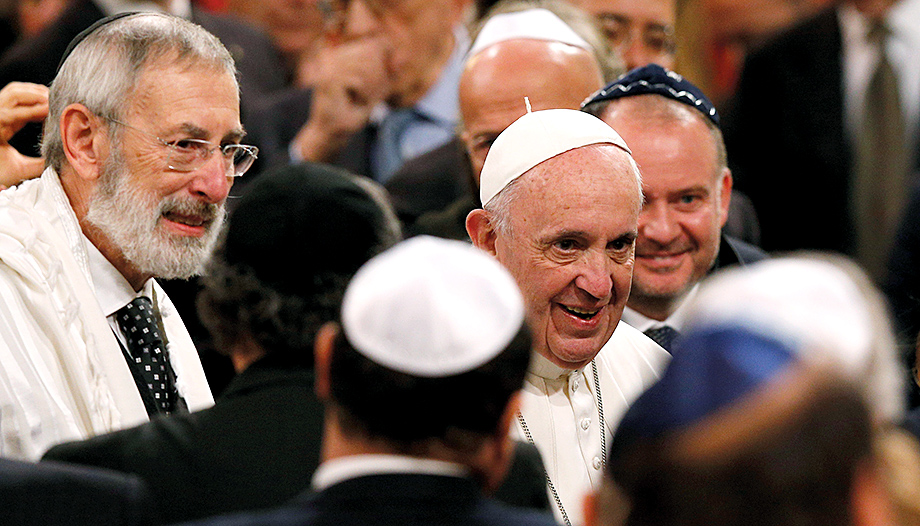Welcomed by the applause, he mingled among the pews to shake hands with those present. The third visit of a pontiff to the synagogue in Rome - after the historic first visit of St. John Paul II in 1986 and that of Benedict XVI in 2010 - was marked by no less enthusiasm.
The Pope arrived at the Templo Mayor on Sunday evening, January 17, to celebrate the fiftieth anniversary of the publication of Nostra Aetatethe statement of the Vatican Council II which paved the way for the consolidation of relations between the Catholic Church and the Hebrews.
Precisely in mid-December, the Vatican Commission for Religious Relations with Judaism issued a document in which it took stock of the results achieved in these fifty years. The text stressed the importance of deepening "reciprocal knowledge", as well as the common commitment "to justice, peace, the safeguarding of creation and reconciliation throughout the world" and the fight against all racial discrimination. A large part of the document was obviously reserved for the "theological dimension" of the dialogue, which still needs to be studied further.
The visit of Pope Francis to the Great Temple in Rome is part of this positive "tradition" and was welcomed by those who welcomed and hosted him: Roman Jews, representatives of Italian Judaism, Italian rabbis and rabbinical delegations from Israel and Europe. The Chief Rabbi of Rome, Riccardo di Segni, spoke of "an event whose scope radiates a beneficial message to the whole world".
In her greeting to the Holy Father, Ruth Dureghello, President of the Hebrew Community of Romesolemnly declared that "today we are writing history once again". A Pope who as Archbishop of Buenos Aires cultivated solid relations with Judaism - he himself recalled that he used to "go to the synagogues to meet with the communities gathered there, closely follow the Hebrew feasts and commemorations and give thanks to the Lord" - and who has "reaffirmed them from the first acts of his pontificate", above all condemning anti-Semitism on various occasions.
Indeed, Dureghello pointed out, "hatred that is born of racism and finds its foundation in prejudice or, worse, uses the words and name of God to kill, always deserves our rejection". From this awareness is born "a new message" in the face of contemporary tragedies: "Faith does not generate hatred, faith does not shed blood, faith calls for dialogue".
In this line, Chief Rabbi Di Segni was categorical: "We welcome the Pope to remind us that religious differences, which must be maintained and respected, must not serve as a justification for hatred and violence, but that there must be friendship and collaboration, and that the experiences, values, traditions and great ideas that identify us must be placed at the service of the community".
"In interreligious dialogue it is fundamental that we meet as brothers and sisters before our Creator and praise Him, that we respect and appreciate each other and try to collaborate," Pope Francis urged in his greeting.
"We all belong to a single family, the family of God, who accompanies us and protects us as his people. Together, as Jews and Catholics, we are called to assume our responsibilities towards this city, making our contribution, above all spiritual, and helping to resolve the various problems of today," the pontiff continued.
Francis then alluded to the theological question of the relationship between Christians and Jews, repeating that there is an inseparable bond that unites these two communities of faith: "Christians, in order to understand themselves, cannot fail to refer to their Hebrew roots, and the Church, while professing salvation through faith in Christ, recognizes the irrevocability of the Old Covenant and the constant and faithful love of God for Israel".
Turning his gaze to contemporary tragedies, the Pope recalled that "where life is in danger, we are called all the more to protect it. Neither violence nor death will ever have the last word before God, who is the God of love and life. The last words of greeting were to recall the Shoah and the sixty million victims: "The past must serve as a lesson for the present and for the future".











